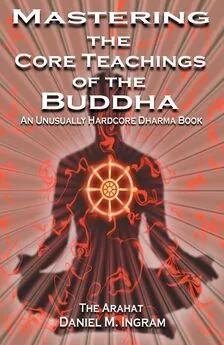Daniel Ingram - Mastering the Core Teachings of Buddha - An Unusually Hardcore Dharma Book
- Название:Mastering the Core Teachings of Buddha - An Unusually Hardcore Dharma Book
- Автор:
- Жанр:
- Издательство:Aeon Books
- Год:2009
- ISBN:9781904658405
- Рейтинг:
- Избранное:Добавить в избранное
-
Отзывы:
-
Ваша оценка:
Daniel Ingram - Mastering the Core Teachings of Buddha - An Unusually Hardcore Dharma Book краткое содержание
Mastering the Core Teachings of Buddha - An Unusually Hardcore Dharma Book - читать онлайн бесплатно полную версию (весь текст целиком)
Интервал:
Закладка:
I had barely taught in the previous 6 years as my own practice has consumed most of the scant free time I had, but a few days after seeing it I told my teacher I was thinking of teaching again. He shot me an uncharacteristically sharp glance and said in a forceful and commanding voice, “Good!”
I have learned all sorts of useful and interesting things since then, but seeing through the center point was the essential thing. Many, many thanks to everyone and everything that made all of this possible, from the people who taught the Buddha to those who carry his knowledge forward today, from the people who cooked in the meditation centers I stayed in to the usurious credit card companies that loaned me the money to keep going on retreats, and for everything else in this wide world that made it happen: Thank you, thank you, thank you!
In addition to my successes, I felt very comfortable writing about the many ways that one can screw up on the spiritual path, either because I had done so myself, because one or more of my respected dharma companions had done so or, most often, for both reasons. I can’t tell you how many stupid things I thought, said and did along the way while in desperate pursuit of something that was right there all along, and I continue to make countless errors when trying to spread the dharma and live my life. The only state, stage or attainment I write about from theory rather than experience is Buddhahood.
348
So Who The Heck Is Daniel M. Ingram?
There are a few practical uses for such information. It is potentially useful to disclose that I have made countless errors on the spiritual path so that this may counter the notion that I am coming from some useless
“holier than thou” position and also to try to counter in others the sense that they are the only ones who make numerous errors on the spiritual path. I hope it was not necessary. As someone wise once said, “The life of a Zen Master is one continuous mistake,” and that goes equally for the rest of us.
I feel that the most important positive result that can come from stating, “I know that of which I write,” is the chance that this might create the sense that extraordinary things may be understood and attained by otherwise ordinary people such as and including myself and yourself. I’ve done this stuff while holding down jobs, having relationships, and pursuing graduate studies. I did it on a few weeks or months of retreat time here and there with a lot of daily practice. My total retreat time from beginning to arahatship was about 8 months with the longest sit being 27 days. The point that I am trying to make is that these techniques and practices are powerful and effective for those who take the time to follow them. If I can convey the sense that this is true by going on and on about what “I” have accomplished, then doing so serves a useful function.
Another possible positive outcome is the sense that might be created in some people that this is not a dead and theory-based tradition that simply rehashed the semi-mythical glory of long dead gurus and ancient writings, but a living tradition with validity in our modern times. The last useful point that might come from someone who has quite obviously achieved nothing even close to self-perfection saying, “I have strong mastery of the core teachings of the Buddha,” is that it might serve to help bring the whole notion of spirituality back down to earth. I am quite willing to look ridiculous and grandiose if there is some chance of it furthering that process, though I realize that it could easily backfire.
Consider carefully the differences and similarities between confidence, arrogance, and empowering others to realize that they can do it also.
The word to the wise is: don’t believe me or anyone else! Take the time to verify these things for yourself from your own direct experience.
I could easily be fooling myself, you or both of us on numerous points 349
So Who The Heck Is Daniel M. Ingram?
and for all sorts of reasons from innocent to evil. There certainly is a well-developed and ancient tradition of doing so. However, “my”
attainments shouldn’t matter so much to you, as the only person’s understanding that will really help you is your own.
My personal experiences with the “psychic powers” are not yet as fully developed as the more fundamental areas, but I have enough experience to be able to help all but the most advanced practitioner of them. As to scholarship, I feel that reading widely and really considering the meaning of what one reads and how it might actually be applied is a very good idea, and have myself read around 150 dharma books, both traditional and modern. While I have been authorized and encouraged to teach by a formal lineage, this is a mere formality and not a sure sign in anyone of real understanding or attainment, much less teaching ability. Luckily, realizations are not dependent on conditions such as formal acceptance into a lineage. I have chosen a lucrative career path that has little to do with meditation, and this eliminates my financial dependence on the dharma and the temptation to water things down for mass consumption or popular appeal, as is so commonly done.
I have found that if I repeatedly ask those who start talking with me about dharma practice the questions, “What do you really want and why?” and, “What would you be willing to do to get that?” I usually come to the conclusion that they are not really interested in the things I am interested in (i.e. the things mentioned in this book), and thus I can turn the conversation to other topics and avoid wasting our time. Those few who do share some of my interests are my dear companions in what I call The Dharma Underground, and for them I am extremely grateful.
But enough about me, let me tell you about my book! I think that I have made my influences and “humble” opinions on a wide variety of other subjects very clear throughout this work. To be truthful, sometimes I have picked up this book and thought, “Goodness
gracious, what a harsh rant. What a heap of reductionist dogma, false certainty, pretentiousness and my own neurotic stuff. I pity the poor, innocent, and pathologically nice, mainstream, ritualistic, disempowered Buddhists unfortunate enough to have picked this thing up and simply been kicked in their soft and flabby posteriors by it to little good effect.”
350
So Who The Heck Is Daniel M. Ingram?
On other days I have picked it up and thought, “Wow, this really is the book that I wished I had read all those years ago when I decided to really go for it. It would have been so extremely helpful to have had so many details about high-level practice laid out this clearly, so many myths dispelled, so much honesty about what the path is and isn’t.
What a joy it is that there are books that convey such an enthusiastic and empowering view on these practices. Maybe there will be a few people out there who just needed a little prodding to realize their full potential as great and powerful meditators. Wouldn’t it be great if I can find a way to get this book into their hands.” I hope that you had something like both reactions, as I think that both points of view have some validity.
Two interesting and practical questions for you are, “Who are you in direct experiential terms?” and “Who is it that knows?” Answer these, and you will come to know all of this directly for yourself. The first and last job of anyone who teaches meditation should be to make herself or himself redundant. This book is the best I have been able come up with to help accomplish this, as I have tried my best to pack it with everything useful that I know.
351
Mastering the Core Teachings of the Buddha
36.CONCLUSION AND BEST WISHES
I do hope that people will not settle for becoming lost in the dogma of this work, Buddhism, or of any mystical tradition. I hope that they learn to actually do the practices that lead to freedom and to the deep integration of that freedom into their lives. I hope that they have faith that mastery can be attained. I hope that they will learn to ask good questions that will help them to accomplish this. I hope that the culture of Buddhism and the world in general will become less sectarian instead of more. I hope that students of meditation will use spiritual conceptual frameworks as tools and not worship them as sacred dogma. I hope that the huge amount of magical and fantastic thinking that accompanies spiritual traditions will immediately vanish from this planet forever.
I hope that those on the path will learn to talk with each other in ways that are conducive to clear practice. I hope that any controversial points made in this little book will promote skillful debate and real inquiry rather than contraction into fear and dogma. I hope that people will work towards actual mastery of the path so that they will no longer need writings such as this one. I hope that people will not spend their lives lost in content but will also delve deeply into the liberating truth of the Three Characteristics. I hope that the level of expectation about what is possible will be raised in a way that is helpful, and that any jealousy or frustration that results from this will be skillfully channeled into precise practice and the joy that it can be done.
May all of this be for the benefit of all beings. Should you realize that you wish to awaken, know that it is within your capabilities and do so.
Mastering the Core Teachings of the Buddha
APPENDIX: THE CESSATION OF PERCEPTION AND FEELING
( NIRODHA SAMAPATTI )
The cessation of perception and feeling, Nirodha samapatti in Pali, is the highest of the temporary attainments. As is traditional in the commentaries, I have included it last. It is discussed in a number of places, including Sutta #44, The Shorter Series of Questions and Answers, The Middle Length Discourses of the Buddha, in a talk given by a female arahat named “Dhammadinna,” and Path to Deliverance by Nyanatiloka, which draws from that fine text. This attainment can neither be said to be a state or not a state, nor can it be said to be purely a concentration attainment or an insight attainment, as it lacks a basis for analysis, meaning that as there is no experience that can be analyzed.
The word “Nirodha” (meaning “Cessation”) is also sometimes used without the qualifier “samapatti” to refer to Fruition, so be careful to keep your terms straight when reading the old texts or speaking with others about these things. I always mean the cessation of perception and feeling when I use the word “Nirodha,” but others may not.
It is said that Nirodha can only be attained by anagamis and arahats (those of 3rd and 4th path) who have some mastery of the formless realms. However, as Bill Hamilton once said, if you are an anagami or arahat, you are bound to run into Nirodha Samapatti eventually. There are some reasons to question whether or not those of the lower stages of awakening might be able to attain this, or how the ability to attain this relates to the number of stages of awakening. However, this is not a subject that I am in a mood to pursue in detail, as I have learned the hard way that such questions do not help in the end. If you manage to attain Nirodha, I wouldn’t fixate on the idea that you have attained at least 3rd path. That said, with a few months of careful work and focused intent, I was able to attain it after completing my third cycle of insight.
One attains Nirodha by fusing insight practices and concentration practices in a fairly gentle way that is much less focused and precise than one would do if one wanted to attain Fruition. I find it easiest to attain when reclining, but the first time I attained it I was sitting. There is nothing that can really be said about this attainment, except for mentioning things about the entrance, exit, and the consequences of the attainment. One rises through the samatha jhanas in a very low-key fashion with some weak awareness of their true nature (the Three Characteristics), enters the eighth jhana (neither perception nor yet non-perception), and then emerges from that state. Sometime shortly thereafter, and without warning or very recent premeditation, one may suddenly enter the cessation of perception and feeling. It must be noted that previous interest in attaining this during the preceding days or weeks tends to increase the chances of this attainment showing up. As one gets better at attaining this, one can slip in the inclination (resolution) to attain it after emerging from the 8th jhana and then forget about it before dropping in.
Читать дальшеИнтервал:
Закладка:





![Дженнифер Гюнтер - The vagina book. Главная книга для тех, у кого есть этот орган [litres]](/books/1061538/dzhennifer-gyunter-the-vagina-book-glavnaya-kniga-dl.webp)




